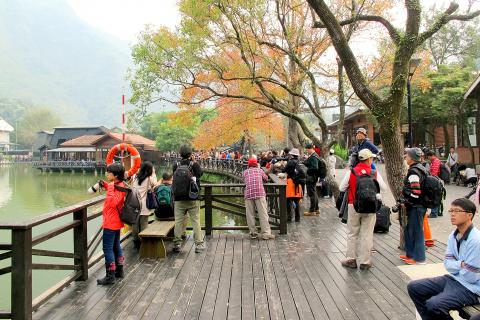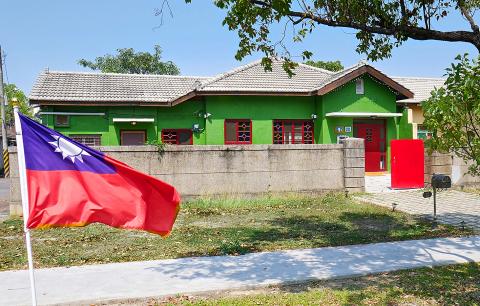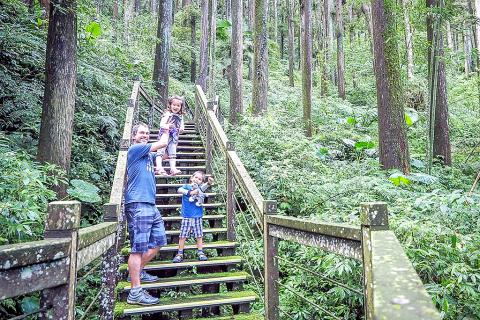On Feb. 9, licensed tour guide George Lu (呂志宏) realized things were likely to get worse before they’d get better. The official death toll from COVID-19 in China had topped 800, and the virus had spread to several other countries.
The previous day, Taiwan’s Central Epidemic Command Center had announced that travelers entering the country after transiting through Hong Kong or Macau would have to stay in home quarantine for 14 days. As people throughout the world reviewed their travel plans, Lu received a slew of coronavirus-related cancellations. He decided he’d have to develop another source of income.
That afternoon, he put a notice on the bulletin board in his apartment building in New Taipei City’s Tucheng District (土城), advertising his services as an English tutor. Lu has found some students, but his current income is less than a quarter of what he can earn by leading tours for 20 to 25 days each month. “Unlike tourists, students never tip,” he rues.

Photo: Steven Crook
In Taiwan, few industries are feeling the pinch from COVID-19 more than tourism. The epidemic was likely one reason behind the abrupt closure earlier this month of the Landis Taichung (台中亞都麗緻飯店), a five-star hotel.
Taipei’s National Palace Museum, a must-see for both Taiwanese and foreign tourists, was visited by a mere 62,144 people last month, compared to 207,677 people in January, and 407,593 in February of last year. According to a volunteer answering the telephone at the visitor center in Checheng (車埕), the number of people visiting this spot in Nantou County on weekends is “down by more than half.”
CANCELED TOURS

Photo courtesy of Touch of Zen Guest House
Mark Pemberton, founder and managing director of private tour company Life of Taiwan, says that their first cancellation was an Israeli couple who had signed up for a 14-day tour. After arriving in Hong Kong on Jan. 27, they immediately decided to head home. (Full disclosure: this reporter writes and consults for Life of Taiwan on an ad hoc basis.)
Pemberton says that about 80 percent of his company’s tours between mid-January and the end of next month have been scrapped, and he’s bracing for further cancellations or postponements.
Life of Taiwan has been offering full refunds or credit for those who plan to rebook at a later date. The former cost the company a significant amount of money, even if all deposits paid to secure accommodation are retrieved.

Photo courtesy of Nick Kembel
“If a client pays by credit card, the card company takes at least 2 percent before passing the money onto us. If we give a refund through the card, the client has to receive the full amount, so we need to pay another 2 percent on top of the amount we send. We end up out of pocket,” Pemberton explains.
He praises his core employees for their willingness to shift to a part-time schedule in order to cut costs, saying: “I certainly sympathize with agencies which have heavier overheads. We’re going to use this quiet period to optimize our products and refine our systems. We want to bounce back as an even better company — but this year is going to be a wipe-out. We have the resources to ride out the storm until next year. While we’re not counting on government assistance, we do hope there’s some help for the industry as a whole.”
Simon Foster, co-destinations manager (with his wife, Tot) at the Taiwan office of cycling-tour specialists Grasshopper Adventures, hopes to be back on track by September or October.
“The effective job Taiwan has done so far at minimizing the impact of the virus has been noted by the international press, and may be the reason we continue to get bookings for later in the year, while operators we know in other countries are not. But we’ve written off the first half of the year, and June to September is our quiet season,” he says. “There’s little we can do about [the situation]. We’re trying to turn this crisis into an opportunity, and use the time to get our new bikes road-ready, improve business practices, train staff, and get on with the other jobs we don’t normally have time for.”
EMPTY ROOMS
None of the luxury or high-end hotels contacted by this reporter were willing to discuss the pandemic’s impact on occupancy rates or food-and-beverage sales. Some smaller businesses, however, are candid about the struggles they’re facing.
Chris Kuo (郭哲均), former chairman of the Yilan County Lodging Association, says most homestays in Yilan have suffered many cancellations for the next two months, with some due to flights being canceled.
Kuo advises his members to make use of the Tourism Bureau’s various loan schemes to reduce short-term financial pressures, as well as adjusting staff working hours. Unlicensed accommodation providers — which, he estimates, account for 35 percent to 45 percent of Yilan’s B&Bs — aren’t eligible for government help.
“So far, I’ve not heard of an unusual number of homestays closing down, or their owners trying to sell them. However, if the coronavirus crisis isn’t easing by the end of April, I think we could see several going out of business,” says Kuo, who with his family owns and manages three B&Bs in the Luodong (羅東) area.
In fact, Kuo points out that during situations like COVID-19, many travelers prefer small homestays to big hotels. He foresees that, if the epidemic gets worse, some urbanites are likely to temporarily relocate away from crowded cities: “We’re designing a long-stay program. We don’t know if it’ll work, but it’s a way to try to increase the occupancy rate. We’ll give it a shot,” he says.
A Touch of Zen Guest House (眷村戀影民宿) in Kaohsiung’s Zuoying District saw revenues drop by nearly 40 percent last month compared to January.
“Things dried up pretty abruptly, with a bunch of cancellations and far fewer new bookings. We were fully booked the weekend of Feb. 8 by runners joining the Kaohsiung marathon, but the event was cancelled due to COVID-19. All of our reservations that weekend were understandably canceled,” says co-owner Yueh Shu-wen (岳淑雯).
A Touch of Zen had its soft opening last April and its grand opening in September. “In October, we were fully booked for 12 nights and partially booked for another 11 nights ... December and January were even better,” Yueh says.
At a different location, Yueh and her husband used to run Bark, a hot dog restaurant that they permanently closed on Monday.
Because of coronavirus fears, “dine-in business has been down for everyone, but we think recently we did better than other restaurants, as we had two open-air dining areas,” she explains. “A lot of people prefer that kind of environment than in a closed place with an air-conditioner recycling air. Families with kids told us just that: They felt safe, because they could eat in our courtyard.”
Yueh had planned on closing the business in the spring due to other factors, but the pandemic hastened the decision.
“We probably would’ve stayed open through April or May, but COVID-19 made us shrug and say, ‘why bother?’” she says.
DROPPING PAGE VIEWS
Some travel bloggers are having to tighten their belts. “My Web site’s traffic and earnings, with which I currently support my family of two adults and two infants, are down about 70 percent,” says Nick Kembel, owner of Spiritual Travels.
“Pre-coronavirus, I was seeing well over 200,000 page-views monthly on my site. Now it’s down to around 80,000,” says Kembel, who lived in New Taipei City for more than a decade until October of last year.
The Edmonton, Canada-based writer and photographer spells out why he’s taking an especially big hit: “Normally, about 80 percent of my traffic is to my Taiwan content. After Taiwan, the places I mainly cover are Japan, South Korea, and Italy — some of the countries worst hit by the virus.”
As a member of various blogging and travel forums, Kembel has noticed that those covering Asia and Europe are hit the hardest.
“Through a Facebook group I run, called ‘Taiwan Travel Planning,’ I’ve noticed that a trickle of people are still planning trips to Taiwan, but they’re all concerned about the situation on the ground — what will happen when they arrive, whether things will be open, and if unexpected travel bans or flight cancellations could wreck their trip,” he says.

Taiwan has next to no political engagement in Myanmar, either with the ruling military junta nor the dozens of armed groups who’ve in the last five years taken over around two-thirds of the nation’s territory in a sprawling, patchwork civil war. But early last month, the leader of one relatively minor Burmese revolutionary faction, General Nerdah Bomya, who is also an alleged war criminal, made a low key visit to Taipei, where he met with a member of President William Lai’s (賴清德) staff, a retired Taiwanese military official and several academics. “I feel like Taiwan is a good example of

March 2 to March 8 Gunfire rang out along the shore of the frontline island of Lieyu (烈嶼) on a foggy afternoon on March 7, 1987. By the time it was over, about 20 unarmed Vietnamese refugees — men, women, elderly and children — were dead. They were hastily buried, followed by decades of silence. Months later, opposition politicians and journalists tried to uncover what had happened, but conflicting accounts only deepened the confusion. One version suggested that government troops had mistakenly killed their own operatives attempting to return home from Vietnam. The military maintained that the

Jacques Poissant’s suffering stopped the day he asked his daughter if it would be “cowardly to ask to be helped to die.” The retired Canadian insurance adviser was 93, and “was wasting away” after a long battle with prostate cancer. “He no longer had any zest for life,” Josee Poissant said. Last year her mother made the same choice at 96 when she realized she would not be getting out of hospital. She died surrounded by her children and their partners listening to the music she loved. “She was at peace. She sang until she went to sleep.” Josee Poissant remembers it as a beautiful

Before the last section of the round-the-island railway was electrified, one old blue train still chugged back and forth between Pingtung County’s Fangliao (枋寮) and Taitung (台東) stations once a day. It was so slow, was so hot (it had no air conditioning) and covered such a short distance, that the low fare still failed to attract many riders. This relic of the past was finally retired when the South Link Line was fully electrified on Dec. 23, 2020. A wave of nostalgia surrounded the termination of the Ordinary Train service, as these train carriages had been in use for decades